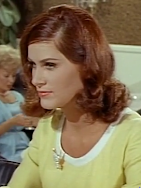The 1954 Western
Broken Lance is a curious film that is both overly familiar and more nuanced than it first appears.
 |
| Father Tracy and sons Holliman, O'Brien, Widmark, and Wagner. |
The plot focuses on the friction between cattle baron Spencer Tracy and three of his four sons (Richard Widmark, Hugh O'Brien, and Earl Holliman). It'd be easy to paint the brotherly trio as the film's villains and youngest son Robert Wagner as the hero. But the reality is that Richard Widmark's bitter son is smarter than his father; he understands the necessity for change and embraces it. His father, meanwhile, adheres to doing business the same way as usual--by bulldozing his way through all obstacles.
 |
| Wagner (sporting a Fabian hair-do) and Tracy. |
Adding to the family discord, Tracy favors youngest son Robert Wagner with the fatherly affection he denied the other three. They grew up as he was building his empire. They toiled alongside their then-widowed father from an early age, rarely earning even a word of praise. Thus, their acrimony is understandable to an extent and it's hard to fault them when they take advantage of their father's folly.
As for their younger sibling, he has his heart in the right place. However, he is also too eager to play the hero. When Wagner's character rashly takes the blame for his father's actions and winds up in prison, it's hard to feel sorry for him. He also seems too eager to play the martyr willing to take the punishment for his dead old dad.
 |
| Edward G. Robinson in House of Strangers. |
Yet, while the family relationships hold one's attention for awhile,
Broken Lance can't overcome a pervasive feeling of familiarity. Perhaps, that's because you've seen
House of Strangers, a 1949 film noir written by Philip Yordan and starring Edward G. Robinson as the headstrong family patriarch and Richard Conte as the good brother.
Just five years later, Yordan transplanted the same plot to the Old West and won an Oscar for Best Writing, Motion Picture Story, for
Broken Lance. Yes, he won an Oscar for a writing a story based on a screenplay written for a previous film! This gets even more interesting, because some reliable sources consider both films to be adapted from Jerome Weidman's 1941 novel
I'll Never Go There Anymore. Of course, one could also argue the influence of Shakespeare's
King Lear.
 |
| Tracy and Katy Jurado. |
The strong cast--which also includes Jean Peters and Katy Jurado--fails to inject much-needed excitement. Spencer Tracy could play a take-charge cattle baron in his sleep. As his wife--the calm voice of reason--Jurado earned an Oscar nomination for Best Supporting Actress.
Director Edward Dmytryk, whom I tend to associate with film noir (e.g.,
Cornered) and tight dramas, sets the action against some breathtaking vistas. He teamed with Tracy and Wagner again two years later for
The Mountain.
This was his sixth film following his return to the U.S. in 1951 after four years overseas. He left the country after refusing to testify before the House Un-American Activities Committee (HUAC) as one of the "Hollywood Ten." When Dmytryk returned to the States, he was arrested and served six months in a West Virginia prison before agreeing to name names before the HUAC in 1951. In his 1996 book
Odd Man Out: A Memoir of the Holywood Ten, he explains his change of heart about testifying: "[If] I were going to be a martyr, I wanted the privilege of choosing my martyrdom. . . ."
I met Dmytryk in the late 1970s when he gave a guest lecture at Indiana University. He signed his name alongside the entry about him in my copy of
The Filmgoer's Companion.
This post is part of the Classic Movie Blog Association's Banned and Blacklisted Blogathon. Check out all the entries on the blogathon schedule by clicking here.


























